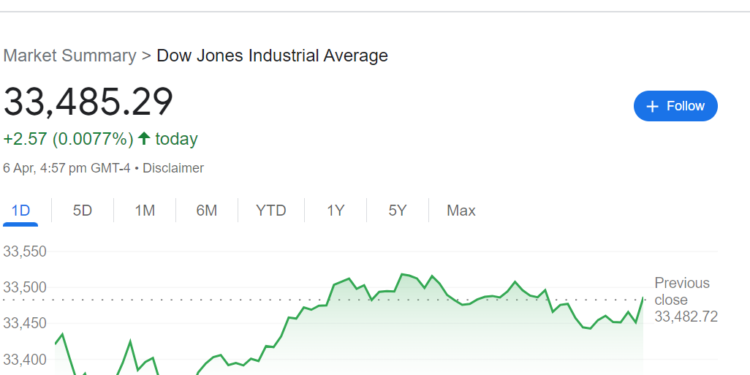The Dow Jones Industrial Average (DJIA), often referred to simply as the Dow Jones, is one of the world’s most widely recognized stock market indexes. It is a crucial indicator of the stock market’s performance and a barometer of the economy’s overall health. In this article, we will delve into the history and composition of Dow Jones and its role in the global financial market.
History of the Dow Jones
The Dow Jones was first introduced in 1896 by Charles Dow, a financial journalist and co-founder of Dow Jones & Company. At the time, the index comprised just 12 companies in the industrial sector, such as General Electric, American Tobacco, and United States Rubber.
Since then, the Dow Jones has undergone several changes. Dow Jones has expanded to include 30 companies in various sectors, such as technology, healthcare, and financial services. It has also evolved to incorporate more sophisticated methodologies for calculating its value, such as using market capitalization instead of stock prices.
Composition of the Dow Jones
As mentioned, Dow Jones comprises 30 companies across a range of sectors. These companies are selected by The Wall Street Journal editors, which is owned by Dow Jones & Company. The selection criteria include the company’s reputation, financial stability, and contribution to the U.S. economy.
The current components of Dow Jones include well-known names such as Apple, Microsoft, Johnson & Johnson, and Goldman Sachs. The index is often used as a benchmark for mutual funds, exchange-traded funds (ETFs), and other investments.
Role of the Dow Jones in the Global Financial Market
The Dow Jones is a critical player in the global financial market, serving as a barometer of the overall health of the U.S. economy. When the Dow Jones rises, it is typically seen as a sign of economic growth and investor confidence. Conversely, a decline in the Dow Jones is often interpreted as a warning of financial troubles.
The Dow Jones also influences other financial markets around the world. For example, changes in the index can impact the value of the U.S. dollar and other currencies. It can also influence the performance of different stock market indexes, such as the S&P 500 and the NASDAQ.
The Dow Jones also plays a role in individual investor decisions. Many investors use the index to gauge the stock market’s overall direction and make investment decisions accordingly. However, it’s important to note that the Dow Jones is just one indicator of the market’s performance and should not be used in isolation to make investment decisions.
Limitations of the Dow Jones
While the Dow Jones is a widely recognized and influential index, it does have its limitations. One of the most significant is its narrow focus on 30 large-cap stocks. This means that the index may not accurately reflect the performance of the broader stock market or the economy as a whole.
Additionally, the Dow Jones is a price-weighted index, meaning that higher-priced stocks significantly impact the index’s value. This can lead to a skewed representation of the index’s performance, as companies with lower stock prices may have less of an impact on the overall value.
Lastly, Dow Jones does not consider dividends or other distributions, which can be a significant portion of a company’s overall return. This means that the index may not accurately reflect the total return of an investment in a particular company.
Conclusion
The Dow Jones Industrial Average is one of the world’s most widely recognized and influential stock market indexes. It is a crucial indicator of the U.S. economy’s overall health and plays a role in the global financial market.
However, it’s essential to
Also, Read: AMC Stock: Understanding its Current Status and Potential Future











Discussion about this post